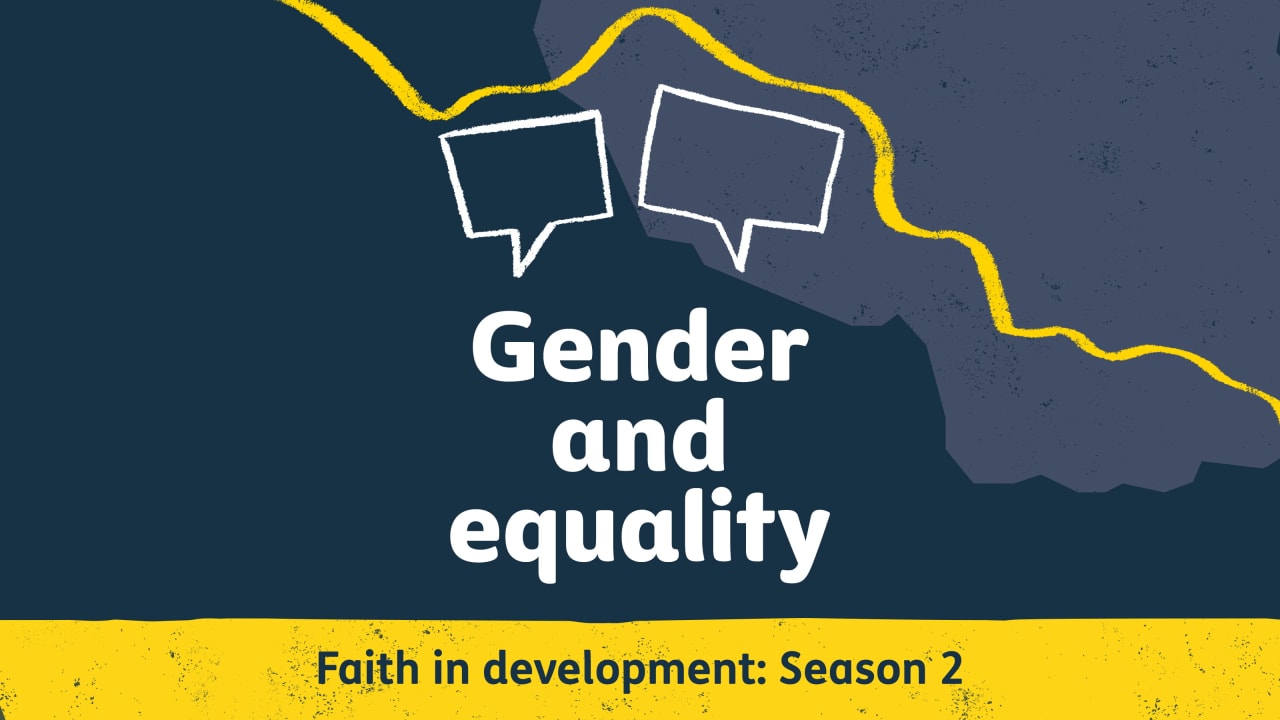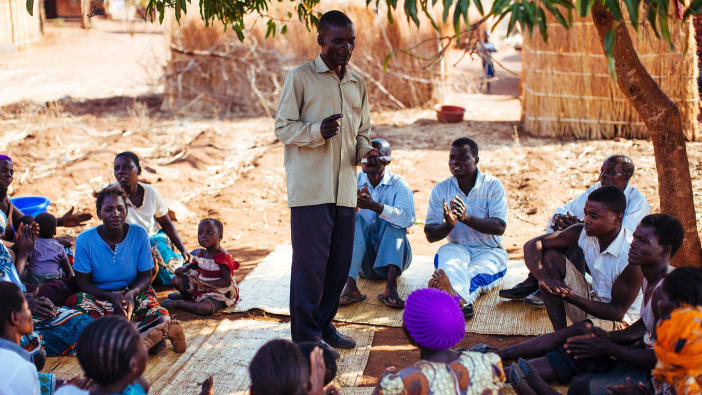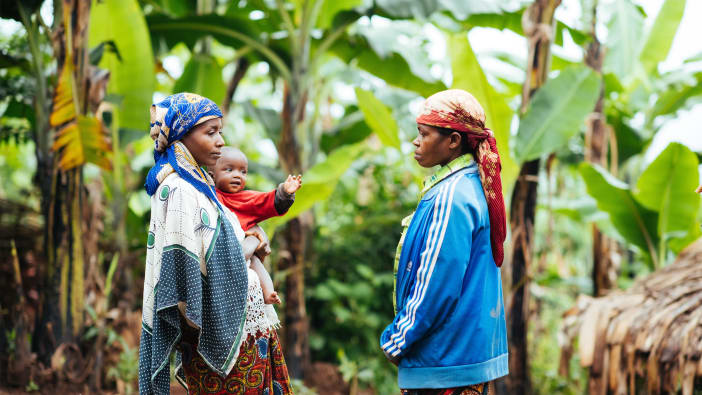Sabine Nkusi 0:08
Hello and welcome back to Season Two of the Faith in development podcast brought to you by Tearfund. I am Sabine Nkusi, your host for this conversation. In the last episode, Tearfund's Gender and Protection Unit members shared the motivation for working on issues of gender equality, and addressing sexual and gender-based violence. Today, our conversation continues, as we delve deeper into some of the challenges we face during this work, and the joy and hope we find in our work.
Podcasts
An introduction to gender and protection (part 2)
Continuing the discussion about gender and protection against gender-based violence
2021


From: Faith in development - Season 2: Gender and equality
A series of conversations on the theme of gender and equality in development
Total Time
Total Time
Sabine Nkusi 0:08
Maybe we can briefly talk about some of the challenges that we have faced or that we see in our work. For me, I think if we look at the statistics that we have around violence against women, so we know that one in three women will experience violence in the course of their lives. And we know that over 200 and estimated 200 million women and girls aged between 15 and 49 have gone through female genital mutilation or cutting. So when we look at the statistics, you know, you just wonder what it is that you what can we do? Right? It is staggering. You feel almost helpless. That has been one of the challenges for me that as we do this work, are these statistics coming down? You know, are we really making an impact, but at the same time, when I hear some of the stories and the countries where we work and the projects that we part of when I hear stories of impact and change, that gives me hope. So that sort of sense of, there's nothing we can do, you know, it completely disappears. Because there's something that is happening somewhere. We're seeing women who are speaking out, we're seeing men who are being challenged internally, about the attitudes, and are also willing and humbled to come forward and actually say, you know, I'm willing to change. So that gives me hope. So I wonder if there are any challenges that you have seen and think this is not working and maybe sort of came through and said, Okay, maybe there's something actually that is happening? Can I start with you, Frankie?
Francesca Quirke 2:22
Yeah. When you look at the statistics, you just feel a bit overwhelmed. Especially, you know, I think we're probably all pretty aware that with COVID, 19 pandemic, it's a combination, right, of increased violence, but also a greater awareness of it. So some of it was there, and some of it increased. And so that kind of makes you think, gosh, you know, are we kind of like climbing a mountain that keeps growing. And that can be definitely disparate, I think the scale of it, and the global nature of sexual abuse, violence. It's not just in one place, but it's pervasive, and it's everywhere. And like, there's all these different, what might think of as expressions of it, different forms of violence that you mentioned, female genital mutilation, early marriage, intimate partner violence, all the many different types of sectarian violence can be quite overwhelming. But I guess in that I think it's possible also to find hope. So I think, you know, if we think about this, this root issue of gender inequality, this fundamental belief that men and women aren't equal and how that perpetuates a lot of these issues, then, when we see that shifting, I think there's a hope for that, that deeper level change. And I think, the work that we've been doing, and whether you alluded to this as well, you know, when community members when there's change in their lives, when faith leaders really change when faith institutions that we see denominations, looking at charts for masculinities, or looking at gender inequality in the Bible in a different way. And that there's a possibility for that to be embedded, you know, in teaching and in seminaries. And for that, to then become a new way of thinking and teaching and living out faith, then the possibility, you know, even at scale is great. The possibility for catalysing change is also great. And we get to interact with people and meet with people who become incredible advocates and champions, and are taking this into all different spheres of society. And so, you know, that gives you hope, and think about the work in Rwanda, almost because of the scale that was revealed through COVID-19. Church leaders were like desperate to find something to respond, they wanted to be able to respond to these situations. And it almost exposed the issues which were otherwise had been hidden in such a way that people were, you know, more ready to address it, men and women and faith leaders across the community. So I think in that way that there is still that hope to see that fundamental shift and change and you know, getting to hear those stories, getting to meet people through workshops or trainings and hearing about those changes in their personal lives and in the communities in the congregations that they lead.
Sabine Nkusi 5:07
That’s what gives me hope. I think it is the stories, isn't it, it is the stories that we hear. And that we have the privilege to be part of that really gives us an indication that there is hope. And that really God is at work, even if we're not necessarily seeing it every day. But he's at work. If I may come to you, Uwezo, are there any challenges that you see? And where do you see hope?
Uwezo Bagumalele 5:34
Great, thanks, the challenges are too many, but I'm going to share about maybe two, our approach is the most preventive approach. And, you know, the response is not there, the holistic reports are not there, especially in different contexts you're working in, you know, sometimes you're working remote villages, where there is no other actors who can support who can contribute to the work we are doing, because we are working on the preventive aspect. And for us, this is the main challenge we are facing. Because after mobilising community members, you know, after sustaining community members, they want to go, you know, as we can find among them, those who have been raped, confirmed victims, among them, and they need support, they need to be taken care of, but sometimes we are not having this service for them. And the other challenge is, you know, community members are using it as volunteers. Some of them can drop out, for example, after being trained, they can be displaced from the low community they are living in. And this is sometimes contributing to bring back the speed we had for the work.
Sabine Nkusi 6:47
And thank you so. So if I may come to, to Solange. Yeah, I think you have alluded to the hope earlier in the conversation. But is there, you know, in the work that you do some of the challenges that you face? Do you see any glimpse of hope that any more of that hope?
Solange Mbonigawa 7:05
Yeah, there is a big package of challenges. But the key out of all those many is the judicial services to survivors. Whenever we talk about the statistics of cases reported, or unreported, even those reported, there are no final, there is no end to it. No justice, this is a key at the community level, where survivors are like hopeless, this time, they're really being pushed back to where they are coming from, because of the lack of judicial systems and the justice not being really looking into their needs. Their hope comes from the courage and the strength survivors are putting up to keep going on a daily basis.
Sabine Nkusi 8:04
Thank you know that that is true that that'd be about the courage of survivors. I think that is the that is the thing that gives us all hope that we can be part of that story as well. You know, can you share with us some of these challenges that you might have faced in your area of work as well, and where you see hope.
Nina Somera 8:26
There are different actually different from multiple challenges in the humanitarian sector. But I think one of them is about participation, meaningful and substantive participation. So the participation of people who are at risk, especially women are the absence of it is an indicator for a gender analysis, or even a context analysis, which is often the basis for us to map the protection needs in a given community that was affected by a certain crisis. So that's, that's one and then the other thing is that I think within the sector itself, gender and protection are not taken as seriously as other humanitarian sectors. So, it is still a field which is still very much informed by power, including, you know, the remnants of colonialism and racism. And there are instances when he also felt that gender and protection stuff are in talking about this in general are being consulted coding code, just so it can be said that, let's say an initiative went through our lenses and sometimes we are also boxed within safeguarding. So we are understood the safeguarding people even though there's a lot of work that are in store in, engender in protection. So I think there are challenges and there are also opportunities The challenges lie in a few areas, which, you know, have been advocated for decades. So, for example, special measures or even recognising care work. So special measures, meaning that we go the extra mile, especially when we are dealing with people who are at risk people who may not have the conditions to participate in a given community. So, for example, a companion meant, or even going really to these communities in order to impart critical and correct and complete information on let's say, gender based violence services, or even what gender based violence means. So, so these special measures should really be a part of everything that we do, because it's not just about delivering services, or it's not just about making an analysis out of a certain situation, but I think, without us facilitating the conditions, in order for us to get the correct data, or without us facilitating the conditions in order for us to talk to the people who are really in need of interventions, then I think it will really have an impact in the quality of our work. The other thing is about recognising care work. So I think this is really important for us. Again, it's about creating the conditions for people to participate, and for people to access protection. So for care work, unless we advocate really for the redistribution of care work, especially in emergency situations, it will be very difficult, especially for women to get out of the household, and explore other opportunities outside the household, which in turn, you know, enables them to be more resilient to shocks, and be able to protect themselves and their families and even be part of a bigger movement. Because sometimes unless they are the loaded from some of these care, work responsibilities, they wouldn't be able to join other women or other groups in the communities and organising themselves, creating some of the services that can be locally available. So I think, you know, the local services, these are the opportunities that we need to harness as we create those conditions for people to participate and engage in any crisis situations that they are in.
Sabine Nkusi 12:42
Yeah, thank you. Thank you very much, you know, look. And lastly, I know that you've worked on various projects in Nigeria, and in Ronda DRC. So where do you see challenges and hope?
Luke Martin 12:56
Yeah, I think everything about this a lot recently, and I think, projects and programs, I mean, they're hard to implement, and they're hard to do. But they're actually very easy compared to the challenge of transforming yourself. And so for me, I think the biggest challenge, and I see this in my own relationships with people, there's so far to go for all of us. And so it's that personal transformation, I think, is a challenge. But on the flip side, so the flip side to everything, that's the biggest hope that I see is that these statistics aren't just out there, you know, in the universe, somewhere, they're there, their reactions of people, and the more we can show people and, and begin to change people's understanding, we're starts with ourselves, those statistics just start changing. And so I'm encouraged that they're transforming masculinities. And the work that we're doing is about that personal change. And, you know, in this work, I'm so encouraged by the people that we meet, and you can just see that there, there's passion, and there is a desire for change. And so it's going to take a long time. And we know that it's been years in the making, but I'm excited and I, you know, I think particularly those who are Bible believing who know God's heart and want to follow his heart, and to follow what he wants, or understand that he just wants to see an end to gender based violence and when we understand that those statistics change, and so, yeah, it's a challenge, but it's also hopeful. I think it starts with us, but yeah, it will happen. And that's, that's the main challenge and hope.
Sabine Nkusi 14:41
Thank you very much. And, and just me following on from that, I think when I look at the journey so far, how we've come as an organisation as a team working on sexual and gender based violence. I have tremendous hope because we have had evidence that change can happen. And I'm really looking forward to, to the sort of next journey for us the next three years, as we think about what it is that Tearfund can do, how can we work with other faith based organisations who respond to sexual and gender based violence? How can we share our learning with the on various platforms. But I'm also, you know, my hope is that we can do this work on a bigger scale as well. Right. So we have done some of that work in different countries. But we want to do more of that, because we have seen the evidence, especially around transfer masculinities, and how lives have been able to change and we want to also keep innovating, we'll keep looking for other areas of work, and just really new ways of supporting marginalised and under-served groups. So that is my hope. And thank you very much team for this conversation. It's just been great to even sit together and reflect together on this. I know sometimes we do it as part of team meetings, etc. but I think it's just been nice to be together and just have this conversation.
Thank you for listening. I hope you enjoy the conversation. Our next episode will focus on the journey to healing which is Tearfund approach to working with survivors. We will be in conversation with a very special lady called expert Esperande, who will share with us her experience of the Journey to healing process. In the meantime, please head to learn.tearfund.org .To find out more about our work. See you next time.
This podcast discusses the sensitive subject of gender-based violence. Please consider whether you may find some aspects of the content uncomfortable to listen to.
Similarly Tagged Content
Share this resource
If you found this resource useful, please share it with others so they can benefit too.

Get our email updates
Be the first to hear about our latest learning and resources
Sign up now - Get our email updates





